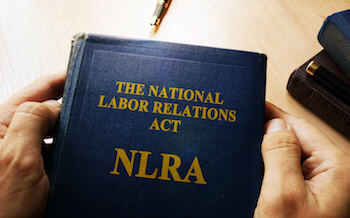
Does the NLRA Protect Employees When They Post on Social Media?
What you write and post on social media can have serious consequences. You need look no further than the recent firing of a CBS executive who posted about the Las Vegas shootings on her Facebook page. Her post was not related to her employer or her employment with CBS. But many employers have social media policies that set guidelines for what their employees can post on social media. These policies are oftentimes too broad and may violate federal labor laws.
The National Labor Relations Act

The National Labor Relations Act (NLRA) was enacted in 1935 as a means to protect the rights of employees who want to improve their work conditions or pay. Under Section 7 of the Act, employees have the right to engage in “concerted activities for the purpose of collective bargaining or other mutual aid or protection.” Online activities, such as posting and commenting on Facebook, may be protected under this section of the Act.
In 2010, the National Labor Relations Board (NLRB), the federal agency that enforces the Act, began making social media a priority in terms of protecting employee rights as they relate to work-related issues. The NLRB recognized that social media is and would continue to be a means by which employees discuss workplace concerns. Since that time, there have been numerous cases involving employees’ rights to raise awareness about work-related issues through the use of social media.
The key to determining whether employees are safeguarded under the Act is whether they are engaged in “protected concerted activity.” Generally, in order to qualify as concerted activity, there needs to be communication about policies, terms or conditions that impact several employees, not just a private, singular grievance of one employee. For example, concerted activities might include employees talking about how the company tracks time worked (a broken time clock) or efforts to address arbitrary and inconsistent assignments for overtime work or discontent over rates of pay. When these conversations occur over social media, and employees are disciplined for participating in those conversations, the NLRA is implicated.
Employers have tried to limit employee use of social media as it relates to their employment for obvious reasons. The last place an employer wants employees to discuss workplace problems is in a public forum. However, many of these policies have been struck down as overbroad and in violation of the NLRA. The NLRB has determined that:
- Employer policies cannot be so expansive that they forbid the type of activity protected by federal labor law; for example, the discussion of wages or working conditions among employees.
- Employees’ comments on social media are typically not protected under the Act if they are simply complaints not made in connection to group activity among employees.
What follows is an example of a case that illustrates how an employer can have an unlawfully broad social media policy and also violate an employee’s right to engage in protected concerted activity on social media.
An Example of an Unlawfully Broad Social Media Policy and Protected Concerted Activity

In July of this year, the NLRB ruled on a case in which an employer, Butler Medical Transport, was accused of violating an employee’s right to engage in a protected concerted activity and had an unlawfully broad social media policy. A portion of the policy stated the following regarding expected employee conduct: “I will refrain from using social media sites [sic] which could discredit Butler Medical Transport or damages [sic] its image.”
An employee who was recently terminated by Butler Medical Transport posted comments on Facebook about being fired. She stated that she was unfairly let go after her employer sided with a patient in a dispute. In response to her post, a few employees commented, one of whom, Employee 1, wrote: “Sorry to hear that but if you want you may think about getting a lawyer and taking them to court.” And then continued by writing, “[Y]ou could contact the labor board too.”
An anonymous employee subsequently took a screenshot of the post and comments and put it on the human resource manager’s desk. Employee 1 was then terminated and later filed charges against Butler Medical Transport.
So how did the NLRB rule? First, they concluded that Employee 1 was taking part in a protected concerted activity. He simply “. . . engaged in a conversation with fellow employees” regarding the termination of another employee and he “advised [the terminated employee] about potential avenues of redress.”
In addition, the Board found that the motivation of Employee 1’s action met the requirement of “mutual aid and protection.” After all, he “posted his comments as part of an online conversation with fellow employees, triggered by one employee’s complaint about what she believed was her unjust discharge—a potential concern for all employees, who have a common interest in job security and protection against such a dismissal.”
Regarding the employer having an overly broad social media policy, the Board stated that the employer’s policy violated Section 8(a)(1) of the NLRA. They found that Employee 1 was disciplined for taking part in a protected activity and for conduct that was not concerted, but that “touches the concerns animating Section 7.” Finally, they found that the employer was unable to show that Employee 1’s comments obstructed their operations. They concluded that the policy itself was overbroad and that is a separate violation of the NLRA. In sum, they found that Employee 1’s discharge was unlawful and the policy was unlawful.
The NLRA was created to protect employee rights, specifically as they relate to working conditions. It’s important to know that these protections now also cover work-related conversations employees engage in on social media. If you feel as though you have been wrongfully terminated or disciplined for what you posted, liked, or commented on social media regarding work-related conversations, your rights are protected under federal law.
At Wenzel Fenton Cabassa, P.A., we’re here to protect your rights and answer your questions regarding protected concerted activity on social media. If you feel as though your rights were violated, contact one of our Employee Rights Attorneys today to schedule your free consultation.
Please Note: At the time this article was written, the information contained within it was current based on the prevailing law at the time. Laws and precedents are subject to change, so this information may not be up to date. Always speak with a law firm regarding any legal situation to get the most current information available.










